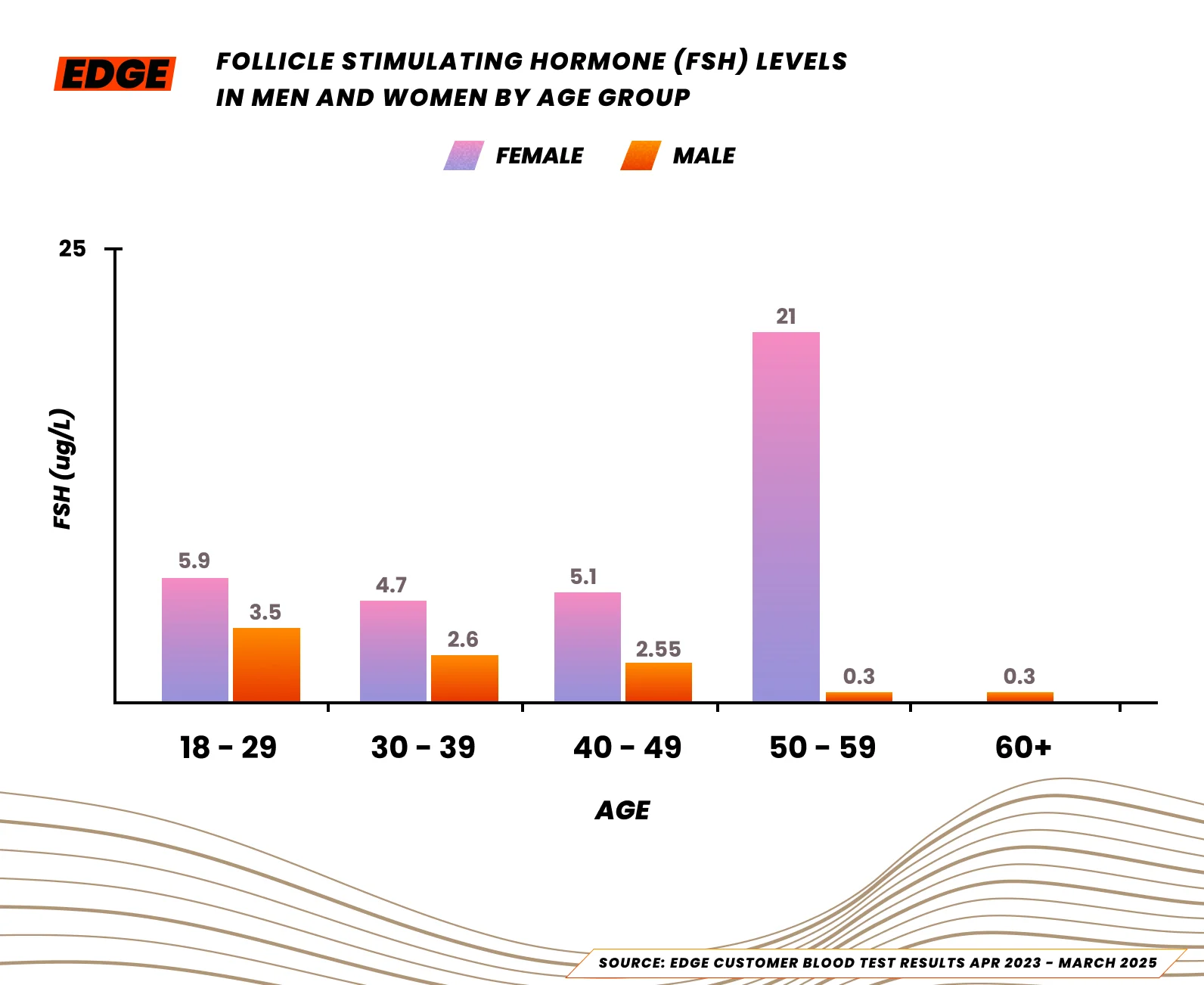What is Follicle-stimulating hormone (FSH) & why is it important for athletes?
1 min read
Published on
May 22, 2025
Written by
EDGE
Share this article
What Is FSH?
Follicle-stimulating hormone (FSH) is a reproductive hormone that regulates the development of eggs in women and sperm in men. For athletes, especially those experiencing menstrual changes, low testosterone, or symptoms of hormonal imbalance, FSH is a critical marker.
It provides insight into reproductive health, hormonal function, and, indirectly, energy availability, all of which can affect training, recovery, and performance.

"FSH is involved in reproductive hormone regulation and is a useful marker for investigating menstrual irregularities or fertility issues in female athletes. When tested, it should be interpreted alongside LH, oestradiol, and progesterone, particularly in cases of low energy availability, RED-S, or amenorrhoea."
Why FSH Matters in Female Athletes
-
Menstrual Function & Hormonal Balance
In women, high or low FSH levels can indicate disruptions to the menstrual cycle. Irregular or absent periods (amenorrhoea) are often a result of low energy availability, excessive training, or hormonal imbalance.
-
Fertility Health
FSH helps assess ovarian function and fertility, an important consideration for women planning to conceive, especially those in long-term training or high-performance sport.
-
Early Detection of RED-S
Relative Energy Deficiency in Sport (RED-S) is common among female athletes and is often accompanied by disrupted hormones, including elevated or suppressed FSH. Left unaddressed, it can impair performance, bone health, and immune function.
Why FSH Matters in Male Athletes
-
Testosterone Production
FSH supports sperm production and indirectly contributes to testosterone regulation. Low levels can signal hormonal suppression due to overtraining or supplement use.
-
Overtraining & Energy Deficiency
Like in women, chronic energy deficiency or high stress in men can disrupt FSH and LH levels, leading to fatigue, poor recovery, or low libido.
-
Long-Term Reproductive Health
For athletes using anabolic steroids or performance-enhancing drugs, FSH testing helps monitor fertility and endocrine system recovery.
What are normal Follicle-stimulating hormone (FSH) levels for athletes?
We looked at blood test data from EDGE customers and found the median FSH levels for men are 2.8 IU/L and 5.3 IU/L for women.
Here is a breakdown of FSH levels by age:
| Table 1: Follicle Stimulating Hormone (FSH) Levels in Men and Women by Age Group (ug/L) | ||
| Age Group | Female | Male |
| 18-29 | 5.9 | 3.5 |
| 30-39 | 4.7 | 2.6 |
| 40-49 | 5.1 | 2.55 |
| 50-59 | 21 | 0.3 |
| 60+ | No Data | 0.3 |
Source: EDGE customer blood test results Apr 2023 – March 2025.
The labs we used to analyse blood samples state a healthy range for Follicle-stimulating hormone (FSH) is generally between 3.5 – 12.5 IU/L for women and 1.5 – 12.4 IU/L for men.
FSH levels rise sharply in women over 50 due to menopause. As ovarian function declines and oestrogen drops, the body increases FSH in an effort to stimulate the ovaries. This hormonal shift is a key marker of menopause.

Symptoms of Hormonal Imbalance in Athletes
-
Irregular or missed periods (females)
-
Low libido or erectile dysfunction (males)
-
Fatigue, mood swings, and poor concentration
-
Difficulty building strength or muscle
-
Bone stress injuries
When Should Athletes Test FSH?
-
When experiencing signs of hormonal disruption
-
If periods have become irregular or stopped
-
During or after use of hormonal contraceptives
-
When assessing fertility or preparing for pregnancy
-
As part of a RED-S assessment or hormonal panel
How to Support Hormonal Health
-
Ensure energy intake meets training demands
-
Avoid very low body fat levels or restrictive eating
-
Get regular sleep and manage stress
-
Avoid excessive endurance training without recovery
-
Test hormones regularly if you're training at high volume
In Summary
-
FSH regulates reproductive hormones and reflects overall hormonal balance
-
Crucial for assessing menstrual health, testosterone status, and RED-S risk
-
Useful in diagnosing hormonal suppression or reproductive issues
-
Should be tested alongside LH, oestradiol or testosterone for a full picture
Check Your FSH Levels
Test FSH to safeguard hormonal health, prevent energy imbalance, and train with confidence — now and in the long term.
Get 10% off your first order
Want regular tips on how to make the most of your results? Join our newsletter and we'll give you 10% off your order!
Get the knowledge
Get expert advice to help you improve your results.
Go to our knowledge center


